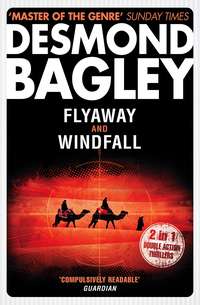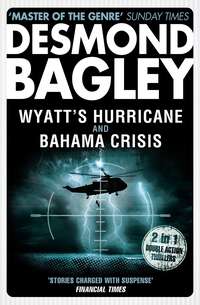
Полная версия
The Vivero Letter
‘Which is?’ I asked.
‘The pre-Columbian civilizations of Central America,’ he answered. ‘A sixteenth-century Spanish tray didn’t mean much to me at the time. I was busy working on a dig in south Campeche. Halstead was with me then, among others. When the dig was finished for the season and we’d got back to civilization he picked a quarrel with me and left. With him went my de Vivero file.’
Halstead’s voice was like a lash. ‘That’s a lie!’
Fallon shrugged. ‘That’s the way it was.’
So far we hadn’t reached any point at which the tray was important, but here was the first mention of the deep-rooted quarrel between these two men, and that might be of consequence so I decided to probe. ‘What was the quarrel about?’
‘He stole my work,’ said Halstead flatly.
‘The hell I did!’ Fallon turned to me. ‘This is one of the things that crop up in academic circles, I’m sorry to say. It happens like this; young men just out of college work in the field with older and more experienced workers – I did the same myself with Murray many years ago. Papers get written and sometimes the younger fellow reckons he’s not given due credit. It happens all the time.’
‘Was it true in this case?’
Halstead was about to speak up but his wife put her hand on his knee and motioned him to silence. Fallon said, ‘Most certainly not. Oh, I admit I wrote a paper on some aspects of the Quetzaecoatl legend which Halstead said I stole from him, but it wasn’t like that at all.’ He shook his head wearily. ‘You’ve got to get the picture. You’re on a dig and you work hard all day and at night you tend to relax and, maybe, drink a bit Now, if there’s half a dozen of you then you might have a bull session – what you English call “talking shop”. Ideas fly around thick and fast and nobody is ever certain who said what or when; these ideas tend to be regarded as common property. Now, it may be that the origin of the paper I wrote happened in such a way, and it may be that it was Halstead’s suggestion, but I can’t prove it and, by God, neither can he.’
Halstead said, ‘You know damn well that I suggested the central idea of that paper.’
Fallon spread his hands and appealed to me. ‘You see how it is. It might have gone for nothing if this young fool hadn’t written to the journals and publicly accused me of theft. I could have sued the pants off him – but I didn’t. I wrote to him privately and suggested that he refrain from entering into public controversy because I certainly wasn’t going to enter into an argument of that nature in the professional prints. But he continued and finally the editors wouldn’t print his letters any more.’
Halstead’s voice was malevolent. ‘You mean you bought the goddamn editors, don’t you?’
‘Think what you like,’ said Fallon in disgust. ‘At any rate, I found my de Vivero file had vanished when Halstead left. It didn’t mean much at the time, and when it did start to mean something it wasn’t much trouble to go back to the original sources. But when I started to bump into the Halsteads around every corner I put two and two together.’
‘But you don’t know he took your file,’ I said. ‘You couldn’t prove it in a law court.’
‘I don’t suppose I could,’ agreed Fallon.
‘Then the less said about it the better.’ Halstead looked pleased at that, so I added, ‘You both seem free and easy in throwing accusations about. This isn’t my idea of professional dignity.’
‘You haven’t heard the whole story yet, Mr Wheale,’ said Mrs Halstead.
‘Well, let’s get on with it,’ I said. ‘Go ahead, Professor Fallon – or do you have anything to say, Dr Halstead?’
Halstead gloomed at me. ‘Not yet.’ He said it with an air of foreboding and I knew there were some more fireworks ahead.
‘Nothing much happened after that for quite a while,’ said Fallon. ‘Then when I was in New York, I received a letter from Mark Gerryson suggesting I see him. Gerryson is a dealer whom I have used from time to time, and he said he had some Mayan chocolate jugs – not the ordinary pottery jugs, but made of gold. They must have come from a noble house. He also said he had part of a feather cloak and a few other things.’
Halstead snorted and muttered audibly, ‘A goddamn feather cloak!’
‘I know it was a fake,’ said Fallon. ‘And I didn’t buy it. But the chocolate jugs were genuine. Gerryson knew I’d be interested – the ordinary Mayan specialist doesn’t interest Gerryson because he hasn’t the money that Gerryson asks; he usually sells to museums and rich collectors. Well, I run a museum myself – among other things – and I’ve had some good stuff from Gerryson in the past.
‘We dickered for a bit and I told him what I thought of his feather cloak; he laughed about that and said he was pulling my leg. The chocolate jugs were genuine enough and I bought those. Then he said he wanted my opinion on something that had just come in – it was a manuscript account by a Spaniard who had lived among the Mayas in the early sixteenth century and he wanted to know if it was genuine.’
‘He was consulting you as an expert in the field?’ I said. I saw Katherine Halstead lean forward intently.
Fallon nodded. ‘That’s right. The name of the Spaniard was de Vivero, and the manuscript was a letter to his sons.’ He fell silent.
Halstead said, ‘Don’t stop now, Fallon – just when it’s getting interesting.’
Fallon looked at me. ‘Do you know anything about the conquest of Mexico?’
‘Not much,’ I said. ‘I learned a bit about it at school – Cortes and all that – but I’ve forgotten the details, if I ever knew them.’
‘Just like most people. Have you got a map of Mexico?’
I walked across the room and picked an atlas from the shelf. I drew up the coffee table and laid down the atlas turned to the correct page. Fallon hovered over it, and said, ‘I’ll have to give you some background detail or else the letter won’t make sense.’ He brought down his finger on to the map of Mexico close to the coast near Tampico. ‘In the first couple of decades of the fifteen-hundreds the Spaniards had their eyes on what we now know as Mexico. There were rumours about the place – stories of unimaginable wealth – and they were poising themselves to go in and get it.’
His finger swept in an arc around the Gulf of Mexico. ‘Hernandez de Cordoba explored the coast in 1517 and Juan de Grijalva followed in 1518. In 1519 Hernan Cortes took the plunge and mounted an expedition into the interior and we know what happened. He came up against the Aztecs and by a masterly mixture of force, statesmanship, superstition and pure confidence trickery he licked them – one of the most amazing feats any man has ever done.
‘But having done it he found there were other worlds to conquer. To the south, covering what is now Yucatan, Guatemala and Honduras was another Amerind empire – that of the Mayas. He hadn’t got as much gold from the Aztecs as he expected, but the Mayas were dripping with it if the reports that came up from the south were true. So in 1525 he marched against the Mayas. He left Tenochtitlan – now Mexico City – and hit the coast here, at Coatzacualco, and then struck along the spine of the isthmus to Lake Peten and thus to Coban. He didn’t get much for his pains because the main strength, of the Mayas wasn’t on the Anahuac plateau at all but in the Yucatan Peninsula.’
I leaned over his shoulder and followed his exposition alertly. Fallon said, ‘Cortes gave up personal direction at that point – he was pulled back to Spain – and the next expedition was led by Francisco de Montejo, who had already explored the coast of Yucatan from the sea. He had quite a respectable force but he found the Mayas a different proposition from the Aztecs. They fought back, and fought back hard, and Montejo was no Cortes – the Spaniards were trounced in the first few battles.
‘With Montejo was Manuel de Vivero. I don’t suppose Vivero was much more than a common foot soldier, but something funny happened to him. He was captured by the Mayas and they didn’t kill him; they kept him alive as a sort of slave and as a mascot. Now, Montejo never did pacify Yucatan – he never got on top of the Mayas. Come to that, nobody ever did; they were weakened and absorbed to some extent, but they were never defeated in battle. In 1549, twenty-two years after he started out, Montejo was in control of barely half of the Yucatan Peninsula – and all this time Vivero was a captive in the interior.
‘This was a rather curious time in the history of the Mayas and something happened which puzzled archeologists for a long time. They found that the Spaniards and the Mayas were living and working together side by side, each in his own culture; they found a Mayan temple and a Spanish church built next to each other and, what is more, contemporaneous – built at the same time. This was puzzling until the sequence of events had been sorted out as I’ve just described.
‘In any event, there the Mayas and the Spaniards were, living cheek by jowl. They fought each other, but not continuously. The Spaniards controlled eastern Yucatan where the great Mayan cities of Chichen Itza and Uxmal are, but western Yucatan, the modern province of Quintana Roo, was a closed book to them. It’s still pretty much of a closed book even now. However, there must have been quite a bit of trade going on between the two halves and Vivero, captive though he was, managed to write a letter to his sons and smuggle it out. That’s the Vivero letter.’
He dug into his briefcase again. ‘I have a transcription of it here if you want to read it.’
I flipped open the file he gave me – there was quite a lot of it. I said, ‘Do you want me to read this now?’
‘It would be better if you did,’ he said. ‘We’d be able to get on with the rest of our business a little faster. You can’t understand anything until you read that letter.’
‘All right,’ I said. ‘But I’ll take it into my study. Can I trust you two not to kill each other in my absence?’
Katherine Halstead said coolly, ‘There will be no trouble.’
I grinned at her cheerfully. ‘I’ll have Mrs Edgecombe bring you tea; that ought to keep the temperature down – no one kills over the teacups, it would be downright uncivilized.’
II
To my sons, Jaime and Juan,greetings from Manuel de Vivero y Castuera, your father.
For many years my sons, I have been seeking ways by which I could speak to you to assure you of my safety in this heathen land. Many times have I sought escape and as many times I have been defeated and I know now that escape from my captivity cannot be, for I am watched continually. But by secret stratagems and the friendship of two men of the Mayas I am able to send you this missive in the hope that your hearts will be lightened and you will not grieve for me as for a dead man. But you must know, my sons, that I will never come out of this land of the Mayas nor out of this city called Uaxuanoc; like the Children of Israel I shall be captive for as long as it pleases the Lord, our God, to keep me alive.
In this letter I shall relate how I came to be here, how God preserved my life when so many of my comrades were slain, and tell of my life among those people, the Mayas. Twelve years have I been here and have seen many marvels, for this is the Great City of the Mayas, the prize we have all sought in the Americas. Uaxuanoc is to Tenochtitlan which Hernan Cortes conquered as Madrid is to the meanest village in Huelva, the province of our family. I was with Cortes in the taking of Tenochtitlan and saw the puissant Montezuma and his downfall, but that mighty king was as a mere peasant, a man poor in wealth, when put against even the ordinary nobility of Uaxuanoc.
You must know that in the Year of Christ One Thousand, Five Hundred and Twenty Seven I marched with Francisco de Montejo into the Yucatan against the Mayas. My position in the company was high and I led a band of our Spanish soldiers. I had a voice with Cortes when I was with that subtle soldier and I was high in the councils of Francisco de Montejo, and so I know the inner reasons for the many stratagems of the campaign. Since I have lived with the Mayas I have come to know them, to speak their words and to think their thoughts, and so I know also why those stratagems came to naught.
Francisco de Montejo was – and, I hope, still is – my friend. But friendship cannot blind me to his shortcomings as a soldier and as a statesman. Brave he undoubtedly is, but his is the bravery of the wild boar or of the bull of the Basque country which charges straight without deceit or evasion and so is easily defeated. Bravery is not enough for a soldier, my sons: he must be wily and dishonest, telling lies when appearing to speak truth, even to his men when he finds this necessary, he must retreat to gain an advantage, ignoring the ignorant pleadings of braver but lesser soldiers; he must lay traps to ensnare the enemy and he must use the strength of the enemy against himself as Cortes did when he allied, himself with the Tlascalans against the men of Mexico.
Hernan Cortes knew this most well. He spoke pleasantly to all and of all, but kept his counsel and went his own way. It may be that this use of lies and chicanes, the inventions of the Devil, is against the teachings of Holy Church and, indeed, would be reprehensible when fighting fellow Christians; but here we are fighting the Children of the Devil himself and turn his own weapons against him in the assurance that our cause is just and that with the help of our Lord, Jesus Christ, we can bring these ignorant savages to the One and True Faith.
Be that as it may, Francisco de Montejo was – and is – lacking in the qualities I have named and his efforts to subdue the Maya came to naught. Even now, twelve years after we marched so gaily on our Holy Crusade, the Maya is as strong as ever, though some of his cities are lost. Yet I would not lay all blame on Francisco, for this is as strange a land as any I have seen in all my journeyings in the Americas, where many strange and wondrous things are to be seen daily.
This I will tell you: the land of Yucatan is not like any other. When Hernan Cortes defeated the army of the Mayas on his journey to El Peten and the Honduras he was fighting on the uplands of Anahuac where the land is open and where all the noble resources of the art of war in which we are so advanced can be used. When we marched into Yucatan with de Montejo on the central strongholds of the enemy we found a green wilderness, a forest of trees so vast that it would cover all of Old Spain.
In this place, our horses, which so affright the ignorant savages, could not be used in battle; but we were not cast down, thinking to use them as pack animals. To our sore disappointment they were afflicted by disease and began to die, more each day. And those that survived were of little value, for the trees grew thickly and a man can go where a horse cannot, and from being the most valued of our possessions, they stooped to become a hindrance to our expedition.
Another misfortune of this land is the lack of water, which is very strange, for consider: how is it that there can be a growth of strong trees and bushes of divers kind where there is no water? But it is indeed so. When the rain comes, which it does infrequently but more often at certain times of year, then it is soaked direct into the solid earth so that there are no streams and rivers in this land; but sometimes there is a pool or well which the Maya calls cenote and here the water is fresh and good although it is fed not by running streams but rather issues forth from the bowels of the earth.
Because these places are few in the forest they are sacred to the Mayas who set up their temples here and give praise to their idolatrous gods for the good water. Here also they set up their castles and strong places, and so when we marched with de Montejo we had to fight for the very water for our bellies to give us strength to fight more.
The Mayas are a stubborn people who close their ears to the Word of Christ. They would not listen to Francisco de Montejo, nor to any of his captains, myself included, nor even to the good priests of God in our train who pleaded with them in the Name of our Saviour. They rejected the Word of the Lamb of God and resisted us with weapons although, in truth, since my captivity I have found them a peaceful people, very slow to wrath but in their anger terrible.
Although their weapons are poor, being wooden swords with stone edges and spears with stone tips, they resisted us mightily for their numbers were great and they knew the secret paths of the land and laid snares for us, in which ambuscades many of my comrades were slain and in one of these affrays I, your father, was taken prisoner, to my shame.
I could not fight more for my sword was knocked from my hand, nor could I run on their swords and die for I was bound with ropes and helpless. I was carried, slung on a pole, along many devious paths in the forest and so came to the encampment of their army where I was questioned to some lengths by a great Cacique. The tongue of these people is not so different from the Toltec tongue that I could not understand but I dissimulated and gave no knowledge of my understanding and so by this means was I able to keep hidden from them the place of our main force, nor could they wring it from me by means of torture because of the confusion of tongues.
I think they were going to kill me but a priest among them pointed to my hair which, as you know, is the colour of ripe grain in summer, a strange thing for a Spaniard and more natural in northern lands. And so I was taken from that camp and sent under guard to the great city of Chichen Itza. In this city there is a great cenote and chichen in the Mayan tongue means the mouth of a well. In this great pool are maidens thrown who go down to the underworld and return to tell of the mysteries they have seen in Hades. Surely these are the Devil’s spawn!
In Chichen Itza I saw a Cacique even greater than the first, a noble finely dressed in an embroidered kilt and feather cloak and surrounded by papas or the priests of these people. I was again questioned but to no avail and much was made of my hair and a great cry arose among the papas that surely I was Kukulkan, he whom you will know in the Toltec tongue as Quetzaecoatl, the white god who is to come from the West, a belief among the heathen that has served us well.
In Chichen Itza I spent one month closely guarded in a stone cell but other than that I was not harmed, being served regularly with the corn of these people and some meat, together with that bitter drink called chocolatl. After one month I was sent again under guard to their main city which is Uaxuanoc and where I now am. But the guards were young nobles finely dressed in embroidered cotton armour and with good weapons of their kind. I do not think their armour as good as our iron armour, but no doubt it suffices well enough when they fight among themselves. I was fettered loosely but other than that no harm was offered and the chains were heavy, being of gold.
Uaxuanoc is a large city and there are many temples and big buildings the greatest of which is the temple to Kukulkan, decorated with the Feathered Serpent in his honour. Thither was I taken so that the papas of the temple could behold me and pass judgement whether I was indeed Kukulkan, their chief god. There was much argument among the papas: some said I was not Kukulkan because why would their chief god fight against them? Others among them asked why should not Kukulkan bring his warriors to chastise them with magical weapons if they had transgressed against the law of the gods; rather should they seek in their hearts where the transgression lay. Again, some said that this could not be Kukulkan because he spoke not their tongue, and others asked: why should the gods speak an earthly tongue when they undoubtedly spoke among themselves of things that could not be uttered by human lips?
I trembled before them but kept an outward calm, for was I not in evil straits? If I were not Kukulkan they would sacrifice me in the temple in the manner of the Aztecs of Tenochtitlan and tear the living heart from my body. But if they believed I was their god they would bow down before me and worship and I would be an abomination before Christ and damned thereafter to the pains of hell, for no mortal man is worthy of worship before God.
They resolved their disputation by taking me before their king for him to pass judgement between the divers parties in the manner of their law, he being the sole arbitrator in matters of high state and religion among them. He passed for a tall man among the Mayas though not as tall as would seem so in our eyes; he had a noble countenance and was dressed finely in a cloak of the bright feathers of humming birds and wore much gold about his person. He sat on a golden throne and above his head was a representation of the Feathered Serpent in gold and precious stones and fine enamels.
And he judged in this manner: that I should not be sacrificed but should be taken aside and taught the tongue of the Mayas so that I should be able to utter from my own lips and with their understanding what and who I was.
I was so overjoyed at the judgement of this Solomon that I nearly went on my knees before him but I caught myself up with the thought that indeed I did not know their tongue – or so they thought – and to learn it would take me many months or even years. By this stratagem I saved my life and my soul.
I was taken aside and put into the care of the eldest of the papas, who led me to the great temple where I was given lodging in the quarters of the papas. Soon I found I was free to come and go in the city as I wished although always accompanied by two noble guards and still clinking my golden fetters. Many years afterwards I discovered that the papas gave me this freedom for fear I was indeed Kukulkan and would exact vengeance at a later time if imprisoned. As for the golden chains: was not gold the metal of the gods? Perhaps Kukulkan would not be dishonoured by gold – if indeed this was Kukulkan. The king himself wore golden chains though they did not fetter him. Thus the papas reasoned in fear of disgrace should they be proved wrong in any way.
They taught me their tongue and I was slow to learn, my voice unready and my speech stumbling, and by this means passed many months to the great disappointment of the papas. During this time I saw many abominations in the great temple; young men sacrificed to Kukulkan, their bodies oiled and their heads garlanded with flowers going willingly to the bloodstained altar to have their hearts torn out by the papas and held in their sight before vision faded from their eyes. I was forced to attend these blasphemous ceremonies before the idol of the Feathered Serpent, my guards holding my arms so that I could not leave. Every time I closed my eyes and prayed to Christ and the Virgin for succour from the awful fate to which I found myself condemned.
There were other sacrifices at the great cenote in the midst of the city. A ridge of land splits the city from east to west and on the top of the ridge is the temple of Yum Chac, the god of rain, whose palace these foolish people believe to be at the bottom of the cenote. At ceremonies in honour of Yum Chac maidens are cast from the temple to the deep pool at the bottom of the cliff and disappear into the dark waters. These infidel wickednesses I did not attend.
It was during this time that I found my salvation from the terrible dilemma under which I laboured. You must know that the Mayas are great workers in stone and gold, although much of their labour is directed to making their heathen idols, a task unfitting for Christian hands. My sons, your grandfather and my father was a goldsmith in the city of Sevilla and when I was young I learned the trade at his knee. I observed that the Mayas were ignorant of the way of using wax which is common in Spain so I pleaded with the papas to give me gold and beeswax and to let me use a furnace to melt the gold.









